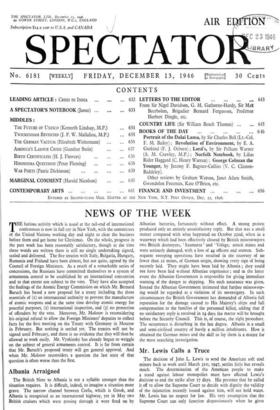NEWS OF THE WEEK
THE furious activity which is usual at the tail-end of international conferences is now in full cry in New York, with the committees of the United Nations working day and night to clear the business before them and get home for Christmas. On the whole, progress in the past week has been reasonably satisfactory, though at the time these words are written there is still no single undertaking signed, sealed and delivered. The five treaties with Italy, Bulgaria, Hungary, Rumania and Finland have been almost, but not quite, agreed by the Council of Foreign Ministers. As a result of a remarkable series of concessions, the Russians have committed themselves to a system of armaments control to be established by an international convention and to that extent not subject to the veto. They have also accepted the findings of the Atomic Energy Commission on which Mr. Bernard Baruch has based a new proposal for a treaty including the three essentials of (r) an international authority to prevent the manufacture of atomic weapons and at the same time develop atomic energy for peaceful purposes, (2) international inspection, and (3) no protection of offenders by the veto. Moreover, Mr. Molotov is reconsidering his original refusal to allow the Foreign Ministers' deputies to collect facts for the first meeting on the Treaty with Germany in Moscow in February. But nothing is settled yet. The treaties will not be signed until February, and there is no evidence that they will then be allowed to work easily. Mr. Vyshinsky has already begun to wriggle on the subject of general armaments control. It is far from certain that Mr. Baruch's proposed treaty will get general approval. And when Mr. Molotov reconsiders a question the last state of that question is often worse than the first.


































